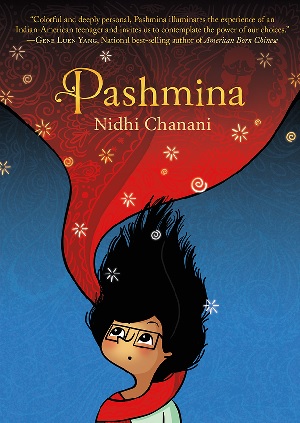 When I first encountered Nidhi Chanani’s artwork, I was sitting with a close friend in her daughter’s nursery. I couldn’t help but pause in front of the gorgeous print hanging over her daughter’s bed, depicting a mother in salwar kameez gently braiding her little child’s hair. The little girl sits patiently, eyes closed in contentment.
When I first encountered Nidhi Chanani’s artwork, I was sitting with a close friend in her daughter’s nursery. I couldn’t help but pause in front of the gorgeous print hanging over her daughter’s bed, depicting a mother in salwar kameez gently braiding her little child’s hair. The little girl sits patiently, eyes closed in contentment.
It reminded me immediately of my own childhood, where I would sometimes sit at my mother’s feet while she massaged a trickle of Johnson’s baby oil into my scalp. In those instances, my mother often narrated how she would sit with my grandmother for the same tel maalish (oil massage) before bed, plaiting her hair into two braids for the next day.
And that is Nidhi Chanani’s talent as an artist: She somehow infuses even simple, mundane moments with warmth and memory, and it’s a skill that translates well to her debut graphic novel, Pashmina (First Second). Pashmina shares the story of Priyanka Das, an Indian-American teenager with a knack for drawing. At school, Pri is teased for her secondhand clothing. At home, Pri struggles with her mother, who refuses to talk about the life she left behind in India — or Pri’s father.
India remains only a figment of Pri’s imagination until she stumbles upon a mysterious pashmina in a forgotten suitcase. When Pri wraps herself in the pashmina, she is transported to a place more vivid and colorful than she has ever seen. But is this the real India? To discover the truth behind the pashmina — and her own family — Pri must travel far beyond her comfort zone.
“While a single book can’t represent the entirety of a diaspora’s experience, Pashmina manages to capture the essence of bicultural angst.”
A longer graphic novel would have allowed for deeper character exploration and smoother transitions between scenes. Nonetheless, Chanani effectively navigates multiple topics that remain notoriously difficult for the South Asian American community to discuss — from single motherhood and fertility issues, to class and unhealthy marriages. When depicted through a teenager’s perspective and a touch of magic, these frequently taboo subjects become even more accessible for younger readers.
Pashmina unravels complexities of adolescence and identity with grace and sensitivity. Pri doesn’t feel like she belongs either in the U.S. or in India, and that liminal feeling is one with which many readers will relate. While a single book can’t represent the entirety of a diaspora’s experience, Pashmina manages to capture the essence of bicultural angst.
* * *
Nina Bhattacharya is a writer and global health educator based in Cambridge, MA. She’s a graduate of the Harvard T.H. Chan School of Public Health and was a 2012-13 Fulbright Fellow in Indonesia. Find her at @onlynina and listen to her on the Almirah Radio Hour.












